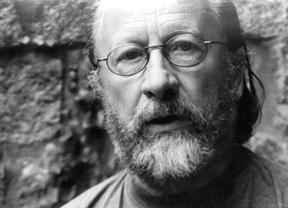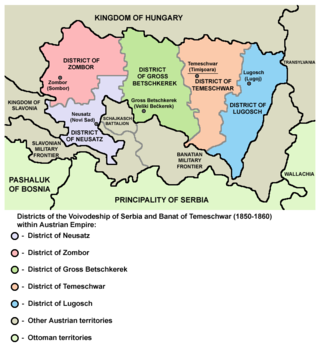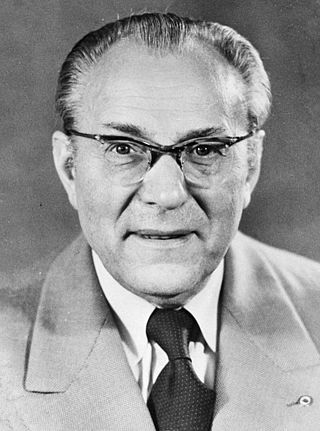Liechtenstein has recognized same-sex registered partnerships since 1 September 2011 following approval by voters in a referendum. Liechtenstein was the second country in the world to pass a partnership law by referendum, after Switzerland in 2005.

Georg Katzer was a German composer and teacher. The last master student of Hanns Eisler, he composed music in many genres, including works for the stage. Katzer was one of the pioneers of electronic new music in the German Democratic Republic and the founder of the first electronic-music studio in the GDR. He held leading positions in music organisations, first in the East, then in the united Germany, and received many awards, including the Art Prize of the German Democratic Republic, the National Prize of the German Democratic Republic, the Order of Merit of the Federal Republic of Germany, and the German Music Authors' Prize.

The National Defense Council of the German Democratic Republic was created in 1960 as the supreme state body of the German Democratic Republic in charge of national defense matters, including mobilization planning. The NVR held the supreme command of the GDR's armed forces, and the NVR's chairman was considered the GDR's commander-in-chief.

Helmut Müller-Enbergs is a German political scientist who has written extensively on the Stasi and related aspects of the German Democratic Republic's history.
Ehrhart Neubert is a retired German Evangelical minister and theologian.

Dagmar Enkelmann is a German politician of Die Linke party.

Christa Luft is a German economist and politician of the SED/PDS. Luft joined the SED in 1958. From 18 November 1989 to 18 March 1990, she was the Minister of Economics in the Modrow government. From 1994 to 2002 she was member of the Bundestag for the PDS.

Dietmar Keller was an East German politician (SED/PDS) who served as Minister for Culture in the Modrow government. After reunification he sat as a member of the German parliament ("Bundestag") between 1990 and 1994.

Volker Kluge is a German sports journalist and former sports official in East Germany.
Ariane Riecker is a German author and director of documentaries and reports. She is known for her documentary Mein Vater, der Türke in collaboration with Marcus Vetter.
Rudolf Neuhaus was a German conductor.
Bruno Flierl was a German architect, architecture critic, and writer. His work focused on architecture, urban development, and city planning of East Germany. He assisted in the design of the Pariser Platz and argued for the preservation of the Palace of the Republic in the debate over the restoration of the Berlin Palace.

Eberhard Hermann Erich Zeidler was a German mathematician, who worked primarily in the field of non-linear functional analysis.

Inner German relations, also known as the FRG-GDR relations, East Germany-West Germanyrelations or German-German relations, were the political, diplomatic, economic, cultural and personal contacts between the two countries; Federal Republic of Germany and German Democratic Republic, at the period of the official West-East division in the German history from the founding of East Germany on 7 October 1949 to Germany's reunification on 3 October 1990.

Temesvár District was one of five administrative districts of the Voivodeship of Serbia and Banat of Temeschwar from 1851 to 1860. Its administrative centre was Temesvár, which was also the capital of the crown land. Following the 1854 reform Temesvár itself was directly subject to the crown land, and so separate from the district, while still acting as its capital.

Lugos District was one of five administrative districts of the Voivodeship of Serbia and Banat of Temeschwar from 1851 to 1860. Its administrative centre was Lugos.

The First cabinet of Otto Grotewohl, also known as the Provisional Government of the GDR was formed by a law on the government of the GDR on October 7, 1949. According to the law, members of the government were: the prime minister, his 3 deputies and his 14 ministers. The number of ministers would increase to 15 after the State Security Department was elevated to a ministry by the Law on the Formation of a Ministry for State Security of February 8, 1950). It existed until November 7, 1950, after which the Council of Ministers became the government of the GDR as the Second cabinet of Otto Grotewohl.

At the inaugural meeting of the People's Chamber on 8 November 1950, Otto Grotewohl was elected Prime Minister. At the same time, the law on the government of the German Democratic Republic was approved and thus given a structure. Grotewohl presented his government at the 2nd meeting of the People's Chamber on 15 November 1950. Among them were 4 state secretaries with their own portfolio, whose secretariats were set up by resolution at the 1st government meeting, which took place before the 2nd Volkskammer conference. At the 2nd government meeting on November 16, 1950, the respective state secretaries of the ministries were appointed by resolution. Among the 21 ministers and almost 30 state secretaries were 13 candidates and members of the Central Committee of the SED, including 4 members of the Politburo. The block parties were represented by a total of 9 ministers and 8 state secretaries, with the CDU alone providing 4 ministers. The DBD was the only block party that did not provide a deputy prime minister at the beginning of the government period. The following overview lists the ministers and state secretaries of the GDR government at the beginning of the government period.

The following overview lists the ministers and state secretaries of the GDR government at the beginning of the government period.

The following overview lists the ministers and state secretaries of the 4th Council of Ministers of the GDR from November 14, 1963, to July 14, 1967.











